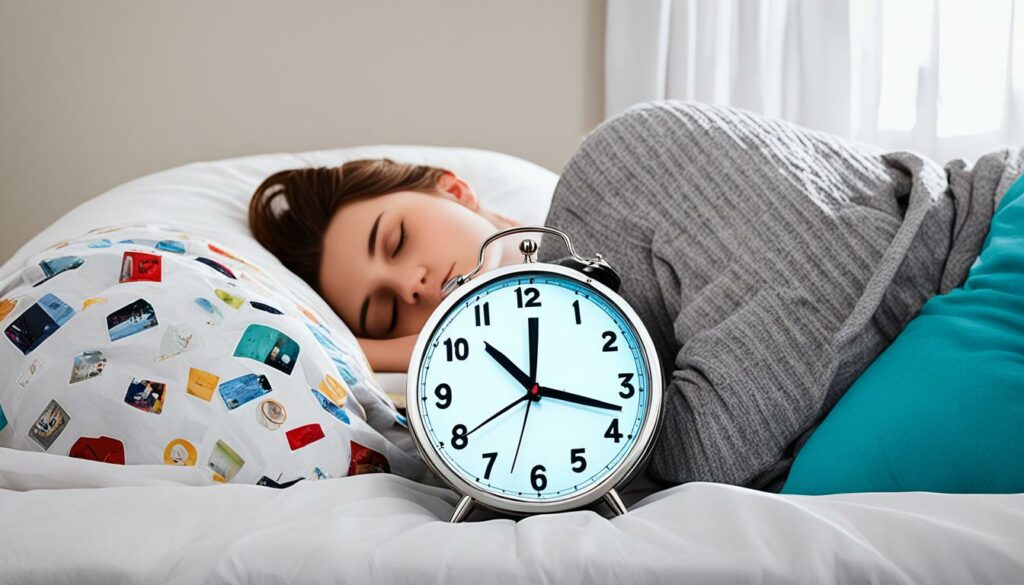Ideal Teen Bedtime: What Time Should Teens Go to Bed?
When it comes to teenagers and sleep, finding the right bedtime can be a challenge. With their busy schedules and active social lives, it’s no wonder that many teens struggle to get enough rest. But what time should teens go to bed to ensure they are getting the sleep they need?
According to the Mayo Clinic, teenagers need about eight to 10 hours of sleep each night to be well-rested and to help them stay healthy. However, many teenagers do not get enough sleep, with about 70% of high school students reporting inadequate sleep on school nights. The internal clock of teenagers shifts during adolescence, causing them to naturally stay up later and wake up later. This can lead to difficulties falling asleep and feeling tired during the day. It is important for teenagers to establish a consistent sleep schedule and prioritize sleep for their overall health and performance.
Key Takeaways:
- Teenagers need about eight to 10 hours of sleep each night for optimal health and well-being.
- The internal clock of teenagers shifts during adolescence, causing them to naturally stay up later and wake up later.
- Establishing a consistent sleep schedule is important for teenagers to ensure they get enough rest.
- Prioritizing sleep can improve teenagers’ overall performance and cognitive abilities.
- Seeking professional help may be necessary for persistent sleep issues that impact a teenager’s well-being.
Why is Adequate Sleep Important for Teens?

Adequate sleep is crucial for teenagers as it provides numerous benefits for their overall health and well-being. Not only does it help fight stress, but it also plays a significant role in improving their mood and attitude while providing them with the energy they need to tackle the challenges of adolescence.
“Getting enough quality sleep is essential for overall teen health and well-being.”
When teens are well-rested, they are better able to concentrate, learn, listen, and think critically, leading to improved school participation and performance. In fact, research has shown that inadequate sleep can negatively impact cognitive abilities, making it harder for teenagers to retain information and perform well academically.
-
Improved School Performance: Adequate sleep allows teenagers to be more alert and focused in the classroom, leading to better academic performance and higher grades.
-
Healthy Physical Development: Sleep is essential for proper physical development and functioning in teenagers. During sleep, the body repairs and regenerates tissue, boosts growth hormone production, and supports the development of healthy muscles and bones.
-
Mental Well-being: Sufficient sleep plays a crucial role in promoting mental well-being in teenagers. It helps regulate emotions, reduces the risk of developing mental health disorders, and improves overall mood and mental resilience.
Sleep also contributes to a healthy body weight by regulating the hormones that control appetite and hunger. When teenagers don’t get enough sleep, their hormone levels become imbalanced, increasing the risk of weight gain and obesity.
Additionally, adequate sleep plays a vital role in managing blood pressure, preventing diabetes, and protecting the immune system. It strengthens the body’s natural defense mechanisms, helping teenagers stay healthy and less prone to illnesses.
Here’s an image illustrating the benefits of adequate sleep for teens:
Overall, ensuring teenagers get enough quality sleep is essential for their physical health, mental well-being, and academic success. By prioritizing recommended bedtime for teenagers, parents and educators can support teenagers in achieving their full potential.
Common Sleep Challenges for Teens

Adolescence is a time of significant changes, and this includes changes in sleep patterns for teenagers. The hormonal shift that occurs during puberty can disrupt their natural sleep-wake schedule, making it challenging for them to fall asleep at an earlier bedtime (Mayo Clinic). In addition to hormonal changes, early school start times also contribute to sleep deprivation in teens. Many teenagers need to wake up earlier than their natural wake-up time, which can further disrupt their sleep patterns (National Sleep Foundation).
The consequences of lack of sleep in teenagers can have a significant impact on their overall health and well-being. Sleep deprivation can lead to mood disturbances, including irritability and feelings of sadness or anxiety. It can also increase the likelihood of engaging in risk-taking behaviors and impair cognitive abilities, making it difficult for teenagers to concentrate and retain information. This can have a direct impact on their academic performance (American Academy of Sleep Medicine).
Furthermore, sleep deprivation in teenagers can also lead to drowsy driving, putting themselves and others at risk on the road. According to the Centers for Disease Control and Prevention (CDC), drowsy driving is a major problem among teenagers and is a significant cause of car accidents (CDC).
“Sleep deprivation poses various challenges for teenagers, affecting their mood, cognitive abilities, academic performance, and even safety. It is crucial to address these common sleep challenges to promote proper sleep and overall well-being in teenagers.”
Consequences of Lack of Sleep in Teenagers:
- Mood disturbances
- Increased risk-taking behavior
- Impaired cognitive abilities
- Poor academic performance
- Drowsy driving
Establishing a Consistent Sleep Schedule

One of the most important steps for teenagers to improve their sleep is to establish a consistent sleep schedule.
Consistency is key when it comes to getting enough quality sleep. This means setting a regular wake-up time and building a sleep schedule around it. Teens should aim for about eight to 10 hours of sleep per night, ensuring they go to bed at a reasonable time that allows them to wake up feeling refreshed.
By sticking to a consistent sleep schedule, teenagers can regulate their body’s internal clock and make it easier to maintain a healthy sleep routine. This helps their bodies recognize when it’s time to rest and when it’s time to wake up.
The Importance of Consistency
Establishing a consistent sleep schedule has numerous benefits for teenage students. It helps optimize their sleep quality, ensuring they get the recommended amount of sleep each night.
- Better Sleep Quality: By going to bed and waking up at the same time every day, teenagers train their bodies to follow a regular sleep pattern. This can lead to more restful and uninterrupted sleep, allowing them to wake up feeling refreshed and rejuvenated.
- Improved Alertness and Focus: A consistent sleep schedule helps teenagers feel more alert and focused throughout the day. They are better equipped to concentrate and absorb information, leading to improved academic performance.
- Enhanced Mood and Well-being: Getting enough sleep on a consistent basis can have a positive impact on teenagers’ mood and overall well-being. It helps regulate emotions, reduces irritability, and promotes mental and emotional resilience.
A consistent sleep schedule is essential for teenage students to optimize their sleep duration and quality. It allows their bodies to establish a healthy sleep-wake cycle and ensures they are well-rested for their daily activities.
Sleep Hygiene Practices for Teens

In addition to establishing a consistent sleep schedule, there are several sleep hygiene practices that can help teenagers create a sleep-friendly environment and improve the quality of their sleep.
- Avoid consuming stimulating substances like caffeine and sugar close to bedtime, as these can interfere with sleep.
- Engage in regular physical activity, but avoid exercising too close to bedtime as it can make it harder to fall asleep.
- Keep electronic devices out of the bedroom to reduce screen time before bed. The blue light emitted by screens can disrupt the sleep-wake cycle.
- Create a sleep-friendly bedroom environment by keeping it cool, dark, and quiet. Consider using blackout curtains, earplugs, or white noise machines if necessary.
By following these sleep hygiene practices, teens can create an optimal sleep environment that promotes better sleep and improves their overall well-being.
Quote
“Creating a sleep-friendly environment is crucial for teenagers to get the quality sleep they need. By eliminating distractions and promoting a calm and comfortable space, teens can improve their sleep and wake up feeling refreshed.”
Benefits of a Sleep-Friendly Environment for Teens
| Benefits | Explanation |
|---|---|
| Better Sleep Quality | A sleep-friendly environment helps teens fall asleep faster and experience deeper, more restorative sleep. |
| Improved Focus and Concentration | Quality sleep enhances cognitive function, allowing teens to stay alert and focused during the day. |
| Reduced Anxiety and Stress | A calming sleep environment can help alleviate anxiety and reduce stress levels in teens. |
| Enhanced Mood and Emotional Well-being | Adequate sleep contributes to emotional regulation and helps teens maintain a positive mood. |
| Optimal Physical Growth and Development | Proper sleep supports healthy physical growth, hormonal balance, and overall development in teenagers. |
A sleep-friendly environment not only promotes better sleep but also positively impacts various aspects of a teenager’s life. By prioritizing the creation of a sleep-friendly environment, teenagers can improve their sleep quality and overall well-being.
Balancing School and Extracurricular Activities
Many teenagers find it challenging to strike a balance between their academic demands, extracurricular activities, and getting enough sleep. The juggling act can have a significant impact on their sleep patterns, leading to sleep deprivation and potential negative consequences on their health and overall well-being.
Teenagers, with support from parents and educators, need to prioritize sleep and make necessary adjustments to their schedules. By finding a balance between school and extracurricular activities, they can ensure they have enough time for restorative sleep, which is crucial for their physical, mental, and emotional development.
One effective strategy is setting boundaries on the amount of time spent on extracurricular activities or after-school jobs. While it’s essential for teenagers to explore their interests and passions outside of school, they also need to allocate sufficient time for sleep. This might involve making difficult choices and prioritizing activities that align with their goals and values.
Advocating for later school start times can also play a significant role in allowing teenagers to get the sleep they need. Numerous medical organizations recommend delaying school start times to better align with the natural sleep patterns of adolescents. This shift would give teenagers the opportunity to get the recommended amount of sleep and improve their overall well-being.
Creating a supportive environment where sleep is valued is crucial. Educators and parents can work together to ensure that the demands of school and extracurricular activities do not overshadow the importance of sleep. By having open and honest conversations, teenagers can feel empowered to communicate their sleep needs and seek necessary adjustments to their schedules.
By striking a balance between school, extracurricular activities, and sleep, teenagers can optimize their overall well-being and set themselves up for success in all areas of their lives.
Seeking Professional Help for Persistent Sleep Issues
If a teenager is consistently experiencing sleep difficulties or poor sleep quality, it may be beneficial to seek professional help. Working with a sleep specialist can provide valuable insights and guidance for addressing sleep issues. A sleep specialist can assess and diagnose potential sleep disorders, and provide appropriate treatment options. If a teenager is struggling with persistent insomnia or other sleep-related issues, seeking professional help can lead to improved sleep and overall well-being.
Getting professional help is crucial when sleep problems become persistent and affect a teenager’s daily life. Sleep disorders such as sleep apnea, insomnia, narcolepsy, or restless legs syndrome require specialized care and treatment. A sleep specialist can conduct a thorough evaluation, which may include a sleep study, to determine the underlying causes of sleep issues.
By working closely with a sleep specialist, teenagers can receive personalized recommendations and treatment plans tailored to their specific needs. This may involve lifestyle changes, such as adjusting sleep habits, implementing relaxation techniques, or using sleep aids when necessary. Cognitive-behavioral therapy for insomnia (CBT-I) can also be a valuable tool for addressing chronic sleep difficulties.
“Seeking professional help for persistent sleep issues is essential for improving sleep quality and overall well-being. A sleep specialist has the expertise to accurately diagnose sleep disorders and provide effective treatment options tailored to each individual’s needs.”
It is important for parents and teenagers to communicate openly about sleep problems and collaborate in seeking professional help. By involving parents in the process, sleep specialists can gain a comprehensive understanding of the teenager’s sleep environment, habits, and overall health. This collaboration allows for a holistic approach to addressing sleep issues and promoting better sleep hygiene.
Benefits of Seeking Professional Help for Sleep Issues
Working with a sleep specialist offers several benefits for teenagers experiencing sleep problems:
- Accurate diagnosis and identification of underlying sleep disorders.
- Customized treatment plans tailored to individual needs.
- Evidence-based strategies and interventions to improve sleep quality.
- Education and guidance on establishing healthy sleep habits and routines.
- Monitoring and follow-up to ensure progress and adjust treatment if necessary.
By seeking professional help, teenagers can take proactive steps towards resolving their sleep issues and improving their overall well-being. The guidance and expertise of a sleep specialist can make a significant difference in achieving restful and rejuvenating sleep.
Parental Role in Supporting Teen Sleep
Parents play a vital role in helping their teenagers establish healthy sleep habits and supporting their sleep schedule. By actively engaging in their teenager’s sleep routine, parents can contribute to their overall health and well-being.
One of the most important ways parents can support their teenager’s sleep is by setting consistent bedtimes and wake-up times. By creating a regular sleep schedule, parents help regulate their teenager’s internal body clock, making it easier for them to fall asleep and wake up at appropriate times. Consistency in sleep-wake times also promotes better sleep quality and duration.
Creating a sleep-friendly environment at home is another crucial aspect of supporting teen sleep. Parents should encourage their teenagers to have a bedroom that is conducive to sleep. This means keeping the room cool, dark, and quiet, which can enhance the quality of their sleep. Additionally, parents can limit screen time before bed, as the blue light emitted from electronic devices can interfere with their teenager’s ability to fall asleep.
Encouraging regular physical activity is also beneficial for promoting healthy sleep habits in teenagers. Engaging in regular exercise during the day helps to regulate sleep patterns and improve sleep quality. However, it’s important to avoid exercising too close to bedtime, as this can have a stimulating effect and make it difficult for teenagers to wind down and relax before sleep.
Parental involvement and support are crucial in helping teenagers establish healthy sleep habits and maintaining a consistent sleep schedule, which is essential for their overall health and well-being.
Parents can also play an advocacy role in supporting their teenager’s sleep. This may involve advocating for later school start times to align with recommendations from medical organizations. Later start times can allow teenagers to get the adequate amount of sleep they need, which can have a positive impact on their overall sleep health and academic performance.
Finding a balance between school and extracurricular activities is another important aspect of supporting teen sleep. Parents can help their teenager prioritize sleep by setting reasonable limits on extracurricular commitments and encouraging time management strategies. By finding this balance, teenagers can ensure they have enough time for sleep without compromising their academic and personal goals.
In summary, parents have a significant role in helping teenagers establish healthy sleep habits and supporting their sleep schedule. By setting consistent bedtimes and wake-up times, promoting a sleep-friendly environment, encouraging regular physical activity, advocating for later school start times, and helping their teenager find a balance between school and extracurricular activities, parents can make a positive impact on their teenager’s sleep health and overall well-being.
Conclusion
Establishing an ideal bedtime for teenagers and maintaining a consistent sleep schedule is crucial for their overall health and well-being. Research suggests that teenagers need about eight to 10 hours of sleep per night to function at their best. Adequate sleep has numerous benefits, including improving mood, cognitive function, academic performance, and physical health.
To promote healthy sleep habits, it is important for both parents and teenagers to prioritize sleep and create a sleep-friendly environment. This includes implementing sleep hygiene practices such as avoiding stimulating substances close to bedtime, maintaining a cool and dark bedroom, and limiting screen time before bed. By taking these steps, teenagers can optimize their sleep quality and quantity, leading to better overall well-being.
For teenagers facing persistent sleep problems, seeking professional help is crucial. Sleep specialists can assess and diagnose potential sleep disorders and provide appropriate treatment options. Additionally, finding a balance between school and extracurricular activities is important to ensure enough time for sleep. Parents can play a vital role in supporting their teenager’s sleep by setting consistent bedtimes, advocating for later school start times, and helping their teenager prioritize sleep.
By prioritizing sleep and implementing these strategies, teenagers can improve their sleep quality, enhance their overall health, and achieve their full potential. Establishing healthy sleep habits from a young age sets the foundation for lifelong well-being and success.
FAQ
What time should teenagers go to bed?
Teenagers should aim to go to bed at a reasonable time that allows them to get 8 to 10 hours of sleep per night.
Why is adequate sleep important for teens?
Adequate sleep is important for teenagers because it helps fight stress, improves mood and attitude, provides energy, enhances concentration and learning abilities, supports physical development and functioning, regulates hormones, manages blood pressure, prevents diabetes, boosts the immune system, and promotes mental well-being.
What are the common sleep challenges for teens?
Common sleep challenges for teens include difficulties falling asleep at an earlier bedtime due to changes in their sleep-wake cycle during adolescence and the early school start times that often require them to wake up earlier than their natural wake-up time.
How can teenagers establish a consistent sleep schedule?
Teenagers can establish a consistent sleep schedule by setting a regular wake-up time and building a sleep schedule around it, aiming for 8 to 10 hours of sleep per night. Consistency in sleep-wake times helps regulate the body’s internal clock and makes it easier to maintain a healthy sleep routine.
What are some sleep hygiene practices for teens?
Sleep hygiene practices for teens include avoiding stimulating substances like caffeine and sugar close to bedtime, engaging in regular physical activity but avoiding exercising too close to bedtime, keeping electronic devices out of the bedroom to reduce screen time before bed, and creating a sleep-friendly environment by keeping the bedroom cool, dark, and quiet.
How can teens balance school and extracurricular activities with sleep?
To balance school and extracurricular activities with sleep, teenagers can set boundaries on the amount of time spent on extracurricular activities or after-school jobs, prioritize sleep, and advocate for later school start times.
When should teenagers seek professional help for sleep issues?
Teenagers should seek professional help for sleep issues if they consistently experience sleep difficulties or poor sleep quality. Working with a sleep specialist can provide valuable insights, assess and diagnose potential sleep disorders, and guide appropriate treatment options.
What is the role of parents in supporting their teenager’s sleep?
Parents play a vital role in supporting their teenager’s sleep by establishing healthy sleep habits, including setting consistent bedtimes and wake-up times, promoting a sleep-friendly environment at home, encouraging regular physical activity, limiting stimulating substances and screen time before bed, and helping their teenager find a balance between school and extracurricular activities.
What is the impact of an ideal bedtime on teen health and well-being?
Establishing an ideal bedtime and consistent sleep schedule is crucial for teen health and well-being. It allows them to get the recommended amount of sleep, which improves mood, cognitive abilities, academic performance, and overall physical health.







